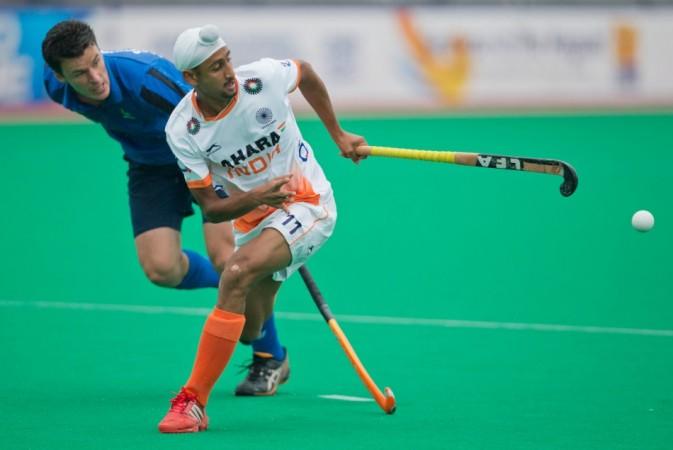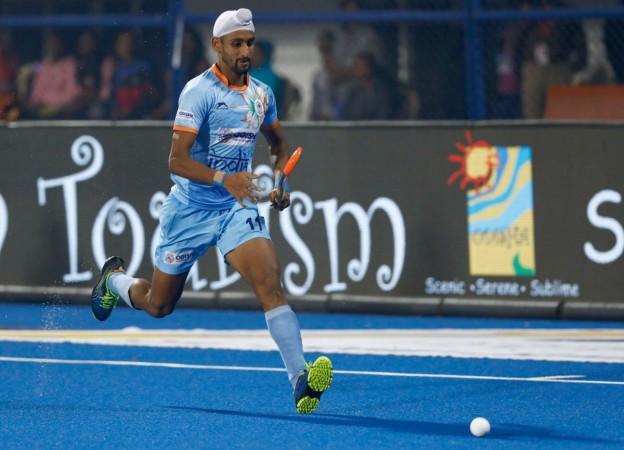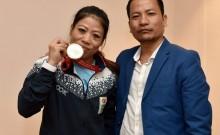
The reason why many people who follow Indian hockey are optimistic about its future is the presence of great young talent in the country. One of the brightest young stars of the team, Mandeep Singh, has emerged as an extremely sharp and astute strikers in international hockey and has impressed many with his skills.
In this exclusive conversation with Akshay Saraswat of International Business Times, India, the 24-year-old discusses the challenges of modern hockey and of dealing with stardom at a young age.
You were recognised as a great talent right from the time you came into the Indian side. Does that put extra pressure on you when you play for India?
Mandeep: Pressure, it's there sometimes and not there on other occasions. Because we want to make 100 percent effort for the team. In the last few tournaments, we were going into the circle but missing out on scoring goals or earning a penalty corner. Now our focus is that, whenever we go into the 'D,' we should get something, at least a PC since we possess good drag flickers.
So, that is the main area of my focus. Earlier, I wanted to score goals, because, as a forward, I used to think I have to score goals. But now, having realised that the ball may be lost if you are in a hurry, whenever the ball goes into the D, we try to get at least a PC out of it.
So, I am not under pressure. Whenever I play in India, especially in Bhubaneswar, I enjoy the experience a lot. That's a good thing.

You said that you try to create at least a PC when you are in the D. But you are adept at taking good positions in the D and at scoring. So, does it get difficult to, at times, decide whether to attempt scoring or earning a PC?
Mandeep: When the match starts, my first attempt is to find space in the D. That's what I do in practice as well, even when I am training alone. If we do well in training, we are obviously going to do well in actual matches also.
I also keep thinking about different ways of doing my job. Where can I move, with whom I have good eye-to-eye communication? This allows me to, when I get the pass, take a first-touch shot instead of stopping the ball? So, that's the thing. When I am in the team, my focus is on what can I do in the D? The first thing is to stop the ball because without it, we won't be able to get anything. So, that's very important.
You have good attackers like SV Sunil, Ramandeep Singh and Akashdeep Singh with you in the team. They usually play from the wings while you are the central forward. How important is their support to you?
Mandeep: Their support is immense because I have been playing with them for the last 6-7 years. We have a very good understanding amongst us. I usually play as a centre-forward but sometimes, our position gets changed. I have great communication with Sunil paaji. Sometimes, I play as the right-forward and he takes a different position. I also have great eye-to-eye communication with Raman and Aakash. So, even when we have our training sessions, we talk to each other about making space and making good passes. So, yes, I have a great understanding with them.
Your team plays in a very aggressive manner and likes to keep attacking. Has the team management asked you to remain high up on the pitch even when you are defending?
Mandeep: Yes, because 4-5 years ago, if we were losing, we used to feel very nervous. But in the last few years, we have started to keep motivating each other. Whenever we score a goal, our aim is to keep scoring. Because if we keep scoring, it will put more and more pressure on the other team. Whether we have scored one, two or three goals, our aim is to continue getting more goals.

In the old days, due to the off-side rule, centre-forwards had to dribble their way past defenders. Now, with that rule gone, centre-forwards usually take a good position in front of the goal posts and wait for a good pass to them. Are you satisfied with this role or do you also feel the desire to do a lot more dribbling and dodging defenders?
Mandeep: These days, hockey has become so fast that you can't play too individualistically. You can't just dribble the ball on your own because there is a lot of pressure put on players by the opposition. So, the more simple our hockey is, the more one-touch our game is, the better it is.
Whether it's me or any other striker, we usually get the ball in the last 25 yards or the D. Our main goal, at that time, is to get a PC, simple as that. But if we get the ball in the centre of the field, then we try to pass the ball and move forward quickly. This allows us to easily beat the opponents.
Punjab has a great tradition of producing quality strikers. People think that the state is going through difficult times with issues relating to drugs and other things. But looking at how you and other quality forwards are still coming through from the state, is it the case that the tradition of hockey is still very strong in Punjab?
Mandeep: I think it is as strong as it was before. Whether it's Punjab or Karnataka, UP or anywhere else, they are all part of India. So, I am happy that the culture of hockey in Punjab is still strong and helping Indian hockey.
You came into the Indian team at a very early age. Did it take some time for you to get used to the big stage and feel comfortable?
Mandeep: Yes, because I played in the junior division first in 2010 and for the next two years as well. But very soon, I was taking part in the senior camp also. When Hockey India League took place in 2013, I played in that as well. At that time, I used to be a little shy with the seniors. But Manpreet Singh, our current captain, who is from the same village as me and has played with me right from the beginning, greatly motivated me and helped me gain confidence, especially when interacting with the seniors.
So yes, at first, when I came into the Indian team, I had some issues but I was also very happy. From that time, I decided that I would give my all for the team and the country and that's what I have been doing.

In the last tournament that your team played – FIH Series Finals in Bhubaneswar – you didn't score as many goals as you are often seen to. Was that a disappointment or were you happy with the performance of the team?
Mandeep: No, I wasn't troubled by that because I knew, if I could get into a good position, I can score a goal. But if I am running after an opportunity to score a goal, then I would unnecessarily invade the space of other strikers. So, goals don't matter, it's the team that matters.
That's why whenever I used to go into the D, I wanted to get a PC. Because it's the team that wins and not the individual. That's why in my mind, if we are not getting a goal but creating PCs, it's a good thing for the team.
Did you always had this line of thinking or did you have to change it after coming into the national team?
Mandeep: No, this line of thinking was there right from the beginning, that team comes first. Because if I run after goals, I will damage my game and that of the team as well. So, the team always came first for me.
Achieving stardom at such a young age, how difficult was that for you to manage?
Mandeep: It does create some problem in the beginning but once we get attached to seniors and spend time with them, you learn a lot from them. You slowly get adjusted to it.

We now have a new system of penalty-shootout. As a striker, you are often involved in them. How much do you practice and prepare for them?
Mandeep: When we have our training sessions, we also have shootout training at the end. I think it's good that we are having such a great practice. Of course, when we are playing a match, our attempt is to ensure that the match doesn't go into a shootout and we win in regular time itself.
But do you try to, personally, improve your ability to succeed in these kinds of situations?
Mandeep: Yes, we do like to improve ourselves in that department. Tricks like how to deceive the keeper by faking a shot and others are practised.
Having played for so long in the international circuit, which goalkeeper did you find the toughest to beat?
Mandeep: Jaap Stockmann of Netherlands. I used to find him a little difficult to deal with because he had been playing for Punjab side in the HIL. His vision is good. I have scored against him so it's not that he is impossible to beat but he has the ability to understand where I am attacking from and cover that area. So, I had some difficulties against him.










